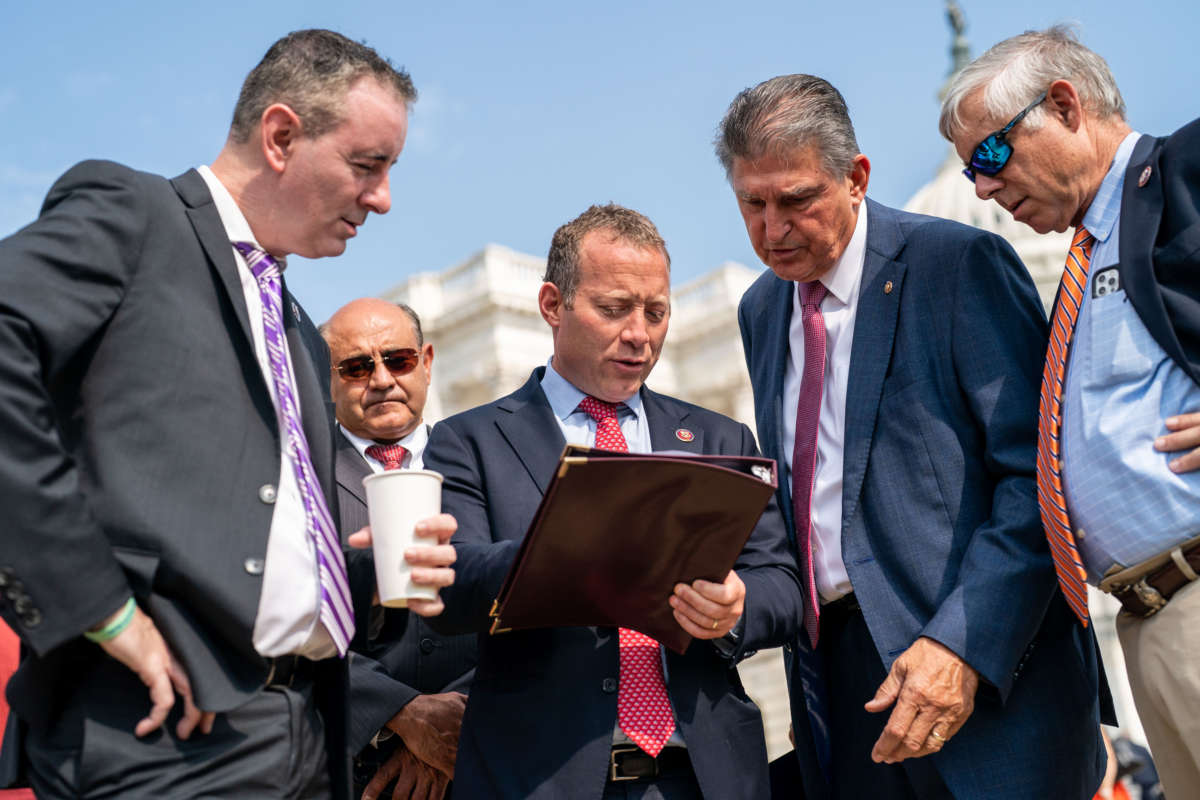Centrist Democrats over the weekend doubled down on threats to kill the Democrats’ $3.5 trillion reconciliation bill, with some of the only major climate proposals that currently stand a chance of passing Congress, after House Speaker Nancy Pelosi (D-California) told lawmakers of a plan to tie the reconciliation and bipartisan infrastructure bills together.
Nine centrist Democrats, led by Rep. Josh Gottheimer (D-New Jersey), last week threatened to tank the reconciliation bill if Pelosi doesn’t first bring the bipartisan infrastructure bill to a near-immediate vote. The House speaker is currently planning to advance both bills together to ensure that the reconciliation bill, which contains many provisions cut by Republicans and conservative Democrats from the infrastructure bill, also passes.
She emphasized that plan on Sunday, saying in a letter that she’s looking into creating a rule that would allow both bills to advance simultaneously. Pelosi is presumably trying to appease both conservative Democrats and progressives in her caucus, the latter of whom say they would reject the infrastructure bill without a sufficient reconciliation package.
The nine centrists are evidently displeased with that plan, responding in a joint statement, “our view remains consistent. We should vote first on the Bipartisan Infrastructure Framework without delay and then move to immediate consideration of the budget.”
The group said last week that they think the infrastructure bill is a win for Joe Biden and that if it’s held up to fit Pelosi’s planned timeline, people will forget about it. One centrist lawmaker, not a signatory to last week’s letter, described the infrastructure bill as being held “hostage” to the reconciliation bill.
Threatening the reconciliation bill, however, is viewed as a far greater danger to President Joe Biden and the Democrats’ agenda. Whereas bipartisanship — however faulty — seems to be one of Biden’s priorities, the reconciliation bill contains a wide swath of Biden’s agenda. It’s also one of his last best hopes to pass climate action while the Democrats still hold the majority in Congress.
“We can’t call people moderate Democrats if they vote against child care, paid leave, health care, and addressing climate change,” said Rep. Pramila Jayapal (D-Washington) on Twitter. “This is the Democratic agenda, it’s the president’s agenda, and it’s what we promised people across America. Now we must deliver.”
Progressives for months have been emphasizing that now is the time to pass climate action as the window to prevent some of the climate crisis’s worst effects is rapidly closing.
Indeed, on Friday, the National Oceanic and Atmospheric Association announced that July is officially the hottest month in Earth’s recorded history since agencies began keeping records 142 years ago. This terrifying news comes on the heels of a tumultuous few months of climate change-effected heat waves in the U.S., which have created unprecedented conditions in the Northwest and across the country.
The news also came shortly after a landmark report from the Intergovernmental Panel on Climate Change (IPCC) found that, even if the world were to somehow stop emitting greenhouse gases immediately, some of the effects of the climate crisis are irreversible and locked in. The world is set to blow past the Paris Climate Agreement goal to keep global warming at 1.5 degrees celsius or less.
Democrats have said in a memo on the reconciliation bill that it will “put America on a path to meet President Biden’s climate change goals of 80% clean electricity and 50% economy-wide carbon emissions reductions by 2030.” One of the major mechanisms for that change could be a clean energy payment program that would incentivize utilities to use clean energy sources.
Meanwhile, the bipartisan group of senators working on the infrastructure bill — who were also, coincidentally, lobbied by Exxon — cut climate out of the bill nearly entirely, leaving a meager amount for electric vehicle funding and not much else.
Climate was sidelined so efficiently by the centrist lawmakers that Sen. Ed Markey (D-Massachusetts) said in June that the deal that centrists were cutting at the time was “climate denial masquerading as bipartisanship.” It’s hard to imagine that this current situation — with conservative House Democrats threatening one of the U.S.’s only chances of cutting emissions for a symbolic “win” for bipartisanship — is much different.
Join us in defending the truth before it’s too late
The future of independent journalism is uncertain, and the consequences of losing it are too grave to ignore. To ensure Truthout remains safe, strong, and free, we need to raise $43,000 in the next 6 days. Every dollar raised goes directly toward the costs of producing news you can trust.
Please give what you can — because by supporting us with a tax-deductible donation, you’re not just preserving a source of news, you’re helping to safeguard what’s left of our democracy.
